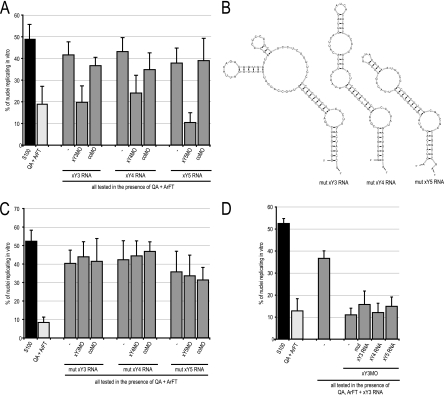Fig. 3.
xYMOs inhibit xY RNA function specifically. (A) xY RNA-specific MOs inhibit xY RNA-dependent initiation of chromosomal DNA replication in a cell-free system. Template nuclei from late-G1-phase human cells were incubated with protein fractions QA and ArFT in the presence of the indicated xY RNAs and MOs. Unfractionated human cell extract containing endogenous hY RNAs (S100) served as a positive control. Proportions of replicating nuclei were determined by immunofluorescence microscopy; mean values and standard deviations are shown. (B) Nucleotide sequences and predicted secondary structures of mutant xY RNAs (mut xY3, -4, and -5 RNA). The predicted structures of mutant xY RNAs are identical to their corresponding wild-type xY RNAs, and mutations are limited to sequences complementary to the respective MOs in the corresponding wild-type xY RNAs (c.f. Fig. 1A). The essential domain for DNA replication is preserved in these mutants. (C) Mutant xY RNAs initiate chromosomal replication in the human cell-free system, but their activity is not affected by xYMOs. (D) xY RNA/xYMO complexes are dominant-negative inhibitors of chromosomal DNA replication, which cannot be overcome by addition of mut xY3, wild-type xY4, or xY5 RNAs.

